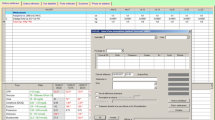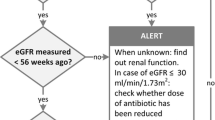Abstract
Background Early interventions with clinical decision support system (CDSS) guidance have ensured appropriate drug dosing for patients with renal impairment. However, the low rates of physician compliance with CDSS alerts have been reported. Objective We investigated whether designated pharmacist interventions were associated with physician’ acceptance of the knowledge-based renal dosage adjustment system (K-RDS) for patients with reduced renal function. Setting A retrospective, single-center study was conducted using a healthcare information system at a tertiary teaching hospital. Methods This study compared physicians’ acceptance of the K-RDS with and without designated pharmacists. The severity of prescription errors and the impact of service provided by the pharmacist were evaluated using the validated method developed by Overhage and Lukes. From April to June 2017, we enrolled patients who were ≥ 20 years of age and admitted with an estimated glomerular filtration rate under 50 ml/min on medications that required dose adjustments. Main outcomes measure The number of dosing alerts of the K-RDS and physicians’ acceptance rates were compared between a control group guided by the central pharmacy only and a group with assigned designated pharmacists. The factors associated with the physicians’ acceptance rate were also analyzed using a multivariate logistic regression method. The impact of service provided by the pharmacist were considered as ‘highly significant’ (categories: 1–2). Severity of prescription errors were defined as ‘serious’ if they corresponded to categories 1–2 of the Overhage and Lukes scale for severity, and interventions were relevant if they corresponded to categories 1–3 in the impact of service provided by the pharmacist scale. Results Among 1363 prescription interventions, 491 (36.0%) were performed by designated pharmacists. The K-RDS alert acceptance rate by the physicians was 54.4% in the designated pharmacist group and 47.0% in the control group (p = 0.0233). The statistically significant association was found in the designated pharmacists group in ‘highly significant’ service provided by the pharmacist (p < 0.001, OR 1.772; 95% CI 1.362–2.305) and ‘serious’ severity of prescription errors (p = 0.012, OR 1.657; 95% CI 1.116–2.460). The presence of designated pharmacists (OR 1.353, p = 0.0272), patient’s gender (OR 0.758, p = 0.0016), department specialty (OR 0.659, p < 0.0001), eGFR (OR 1.538 if < 10 ml/min; OR 1.519 if 10–40 ml/min, p < 0.0001), and medications (OR 6.058–43.992 depending on the medication category, p < 0.0001) were significant factors affecting physicians’ acceptance. Conclusion Pharmacists’ interventions effectively improved physicians’ acceptance of the K-RDS alerts.
Similar content being viewed by others
References
Sittig DF, Krall MA, Dykstra RH, Russell A, Chin HL. A survey of factors affecting clinician acceptance of clinical decision support. BMC Med Inform Decis Mak. 2006;6(1):6.
Chang J, Ronco C, Rosner MH. Computerized decision support systems: improving patient safety in nephrology. Nat Rev Nephrol. 2011;7(6):348.
Hu K-T, Matayoshi A, Stevenson FT. Calculation of the estimated creatinine clearance in avoiding drug dosing errors in the older patient. Am J Med Sci. 2001;322(3):133–6.
Dörks M, Allers K, Schmiemann G, Herget-Rosenthal S, Hoffmann F. Inappropriate medication in non-hospitalized patients with renal insufficiency: a systematic review. J Am Geriatr Soc. 2017;65(4):853–62.
Breton G, Froissart M, Janus N, Launay-Vacher V, Berr C, Tzourio C, et al. Inappropriate drug use and mortality in community-dwelling elderly with impaired kidney function—the Three-City population-based study. Nephrol Dial Transplant. 2011;26(9):2852–9.
Seidling HM, Phansalkar S, Seger DL, Paterno MD, Shaykevich S, Haefeli WE, et al. Factors influencing alert acceptance: a novel approach for predicting the success of clinical decision support. J Am Med Inform Assoc. 2011;18(4):479–84.
Drenth-van Maanen AC, Van Marum RJ, Jansen PA, Zwart JE, Van Solinge WW, Egberts TC. Adherence with dosing guideline in patients with impaired renal function at hospital discharge. PLoS ONE. 2015;10(6):e0128237.
Tawadrous D, Shariff SZ, Haynes RB, Iansavichus AV, Jain AK, Garg AX. Use of clinical decision support systems for kidney-related drug prescribing: a systematic review. Am J Kidney Dis. 2011;58(6):903–14.
Bennett WM. Drug prescribing in renal failure. Drugs. 1979;17(2):111–23.
Pelayo S, Marcilly R, Bernonville S, Leroy N, Beuscart-Zephir M-C, editors. Human factors based recommendations for the design of medication related clinical decision support systems (CDSS). MIE; 2011.
Terrell KM, Perkins AJ, Hui SL, Callahan CM, Dexter PR, Miller DK. Computerized decision support for medication dosing in renal insufficiency: a randomized, controlled trial. Ann Emerg Med. 2010;56(6):623–9.
Payne TH, Nichol WP, Hoey P, Savarino J, editors. Characteristics and override rates of order checks in a practitioner order entry system. In: Proceedings of the AMIA symposium. American Medical Informatics Association; 2002.
Shah NR, Seger AC, Seger DL, Fiskio JM, Kuperman GJ, Blumenfeld B, et al. Improving acceptance of computerized prescribing alerts in ambulatory care. J Am Med Inform Assoc. 2006;13(1):5–11.
Hassan Y, Al-Ramahi RJ, Aziz NA, Ghazali R. Impact of a renal drug dosing service on dose adjustment in hospitalized patients with chronic kidney disease. Ann Pharmacother. 2009;43(10):1598–605.
Salgado TM, Moles R, Benrimoj SI, Fernandez-Llimos F. Pharmacists’ interventions in the management of patients with chronic kidney disease: a systematic review. Nephrol Dial Transplant. 2011;27(1):276–92.
Golightly L, O’fallon C, Moran W, Sorocki A. Pharmacist monitoring of drug therapy in patients with abnormal serum creatinine levels. Hosp Pharm. 1993;28(8):725–7, 30–2.
Long CL, Raebel MA, Price DW, Magid DJ. Compliance with dosing guidelines in patients with chronic kidney disease. Ann Pharmacother. 2004;38(5):853–8.
McMullin ST, Reichley RM, Kahn MG, Dunagan WC, Bailey TC. Automated system for identifying potential dosage problems at a large university hospital. Am J Health Syst Pharm. 1997;54(5):545–9.
Berbatis C, Eckert G, Neale F, Rothwell J. Quality assurance of drug therapy in hospitals: patient serum creatinine values used by ward pharmacists in checking dosage regimens. Med J Aust. 1979;1(2):46–7.
Zaal RJ, Jansen MM, Duisenberg-van Essenberg M, Tijssen CC, Roukema JA, van den Bemt PM. Identification of drug-related problems by a clinical pharmacist in addition to computerized alerts. Int J Clin Pharm. 2013;35(5):753–62.
Calloway S, Akilo HA, Bierman K. Impact of a clinical decision support system on pharmacy clinical interventions, documentation efforts, and costs. Hosp Pharm. 2013;48(9):744–52.
Robertson J, Walkom E, Pearson SA, Hains I, Williamson M, Newby D. The impact of pharmacy computerised clinical decision support on prescribing, clinical and patient outcomes: a systematic review of the literature. Int J Pharm Pract. 2010;18(2):69–87.
Yoo S, Hwang H, Jheon S. Hospital information systems: experience at the fully digitized Seoul National University Bundang Hospital. J Thorac Dis. 2016;8(Suppl 8):S637.
Overhage JM, Lukes A. Practical, reliable, comprehensive method for characterizing pharmacists’ clinical activities. Am J Health Syst Pharm. 1999;56:2444–50.
Pérez-Moreno MA, Rodríguez-Camacho JM, Calderón-Hernanz B, Comas-Díaz B, Tarradas-Torras J. Clinical relevance of pharmacist intervention in an emergency department. Emerg Med J. 2017;34(8):495–501.
Funding
None.
Conflicts of interest
The authors have no conflicts of interest to disclose.
Author information
Authors and Affiliations
Corresponding author
Additional information
Publisher's Note
Springer Nature remains neutral with regard to jurisdictional claims in published maps and institutional affiliations.
Appendix
Appendix
See Table 5.
Rights and permissions
About this article
Cite this article
Choi, K.S., Lee, E. & Rhie, S.J. Impact of pharmacists’ interventions on physicians’ decision of a knowledge-based renal dosage adjustment system. Int J Clin Pharm 41, 424–433 (2019). https://doi.org/10.1007/s11096-019-00796-5
Received:
Accepted:
Published:
Issue Date:
DOI: https://doi.org/10.1007/s11096-019-00796-5




